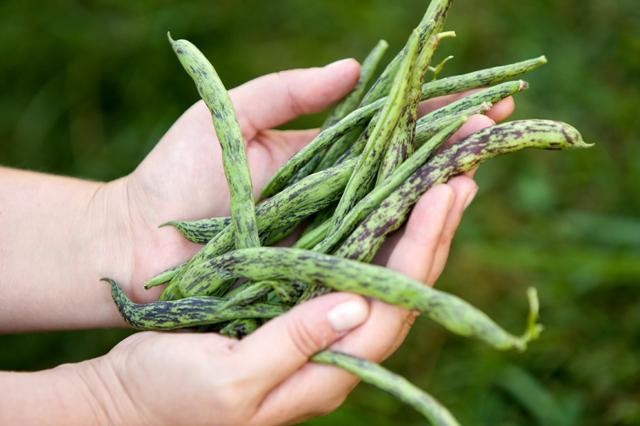Seeds to save
Without seeds, gardens would just be masses of dirt. Everything from tiny tomato germ to a hefty handful of future watermelons hold the keys to life deep within their seed coat.
Asheville is lucky to have several local seed companies that connect growers with varieties that have thrived in our region for centuries.
Local distributor Sow True Seeds offers more than 550 varieties of vegetables, herbs and flowers and is active in the GMO-free movement. GMO-free, open-pollinated seeds are a practical way to keep genetically modified foods out of your soil and off your plate.
As Sow True founder Carol Koury explains, “From our standpoint, the most important sustainability-related issue facing our area (and our country) is the infiltration of genetically engineered crops into our agricultural system and our food supply.” For the past five years, her company has fostered a “love of growing flavorful, fresh-picked and contaminant-free vegetables.”
But how do the seeds get from here to there? Sow True Seed launches its packets from downtown Asheville. Other seed distributors are nestled in the outer reaches of Western North Carolina.
Based in Lake Lure, Amy Hamilton of Appalachian Seeds Farm and Nursery says that one of the most important sustainability issues facing our region is transportation. “There are so many wonderful people and organizations doing so many wonderful things, but we are often located very far from one another,” she explains. An expanded public-transportation system would better connect distributors with customers and provide a more sustainable approach to getting the seeds off the farm and into local gardens.
Whether you get your plants from near or far, WNC seed gurus can transform your plot into a powerhouse of sustainability. http://www.appalachianseeds.com. http://sowtrueseed.com.
The case of the vanishing bees
Colony collapse disorder continues to baffle beekeepers, both in WNC and around the world. No definitive answer on what is killing bumble bees, orchard bees, beetles and butterflies has been found. But recent scientific evidence suggests that neonicotinoids — neuro-active insecticides that are chemically related to nicotine — are contributing to the worldwide disappearance of bees. France, Germany, Italy and Slovenia have suspended the use of some neonicotinoids in specific circumstances, and the European Commission has proposed an EU-wide moratorium on several kinds of neonicotinoid pesticides. California almond-growers, who rely on healthy bee populations, have raised awareness of this possible connection.
Another cause that brings us closer to home: Manicured lawns and “pest-free” plants from other regions may be at fault. Some researchers assert that bees cannot recognize exotic plants as food, and foreign plants often bring outside diseases and pests with them. Providing pollinators with native plants is a natural way to encourage sustainability, both in bees and the flowers and trees that they pollinate.
Local bee activists affiliated with Bee City USA emphasize that native plants are the key to keeping bees healthy. The group, which celebrates Asheville’s recent recognition as a bee hub, released a list of native, pollinator-friendly plants specific to our region. “Each time we plant a native species — one that thrived in our county for thousands of years — we are fortifying the local, complex food web for man, plant and animal,” says Phyllis Stiles, director of Bee City USA, in a recent press release.
The organization, which is a program of the Center for Honeybee Research, recommends that avid and casual gardeners alike sow native plants — such as pink milkweed, blue wild indigo and wild bleeding heart — to encourage pollinators. A list of Bee City USA recommended plants can be found at http://www.beecityusa.org, so pick out your favorites and start a bee haven in your backyard.




Before you comment
The comments section is here to provide a platform for civil dialogue on the issues we face together as a local community. Xpress is committed to offering this platform for all voices, but when the tone of the discussion gets nasty or strays off topic, we believe many people choose not to participate. Xpress editors are determined to moderate comments to ensure a constructive interchange is maintained. All comments judged not to be in keeping with the spirit of civil discourse will be removed and repeat violators will be banned. See here for our terms of service. Thank you for being part of this effort to promote respectful discussion.